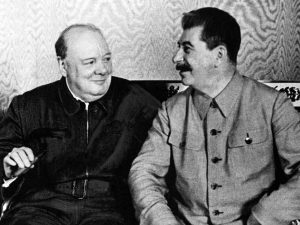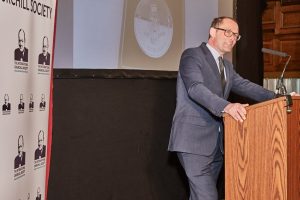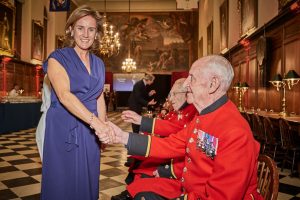Churchill Proceedings
The Ties That Bind
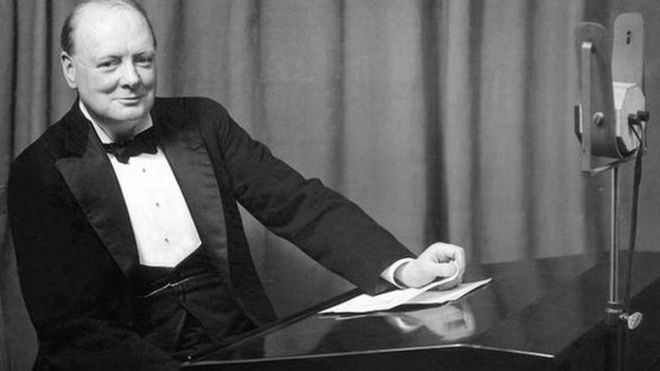
November 14, 2016
Paper presented to the Daughters of the American Revolution, Halifax Chapter
October 13, 2016
Charlotte, North Carolina
by D. Craig Horn
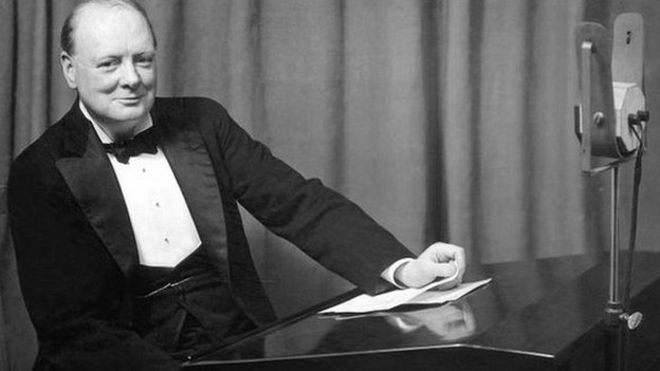 “In War, Resolution; In Defeat, Defiance; In Victory, Magnanimity; and in Peace, Good Will.” This phrase appears on the frontispiece of Churchill’s magnificent “History of the Second World War.” It is an apt description of the character and foresight of three great leaders in three successive centuries of our modern history: George Washington in the 18th Century, Abraham Lincoln in the 19th Century and Winston S. Churchill in the Twentieth Century.
“In War, Resolution; In Defeat, Defiance; In Victory, Magnanimity; and in Peace, Good Will.” This phrase appears on the frontispiece of Churchill’s magnificent “History of the Second World War.” It is an apt description of the character and foresight of three great leaders in three successive centuries of our modern history: George Washington in the 18th Century, Abraham Lincoln in the 19th Century and Winston S. Churchill in the Twentieth Century.
Each was born within a decade of the passing of his predecessor and each held his predecessor in high regard for leadership, tenacity and character. Each cast a long shadow for succeeding generations.
George Washington became the Father of his Country because he represented the Noble Democratic American, a strong-willed, skilled soldier who spoke softly and fought bravely. Abraham Lincoln kept the flame of Liberty burning brightly; he spoke decisively, and gave voice to the principles of Freedom and Democracy. And Winston Churchill, the half-American and all- British Bulldog, stood alone in opposition to perhaps the most vile and despotic regime to have ever threatened the freedoms of not just England but of all free people and the principles that we all hold dear.
All three spent long years out of the limelight until a national crisis propelled them back into the arena. For Washington, it was Shay’s Rebellion and the failure of the Articles of Confederation. For Lincoln, it was the national crisis resulting from the threat of spreading slavery and dissolution of the Union. And for Churchill, it was the outbreak of the Second World War. All three men believed they had been prepared by experience and appointed by history to confront the task before them – a task that was nothing less than the salvation of freedom and the maintenance of a constitutional government.
Although each of these men relied heavily on their own experiences, which were manifest, they were all students of history. But learning from the past without living in the past is an especially difficult challenge. They all knew that they were walking in the boots of history. In a letter to John Armstrong, Washington advised, “We should not look back unless it is to derive useful lessons from past errors, and for the purpose of profiting by dearly bought experience.”(1) Churchill once advised a young American exchange student to “Study history, study history, in it lies (sic) all the secrets of statecraft.”(2)
All three men embodied the determination, strength of character and commitment to take action in order to hold steadfast our liberty – even when others doubted them. In the field of human events, Lincoln was the natural successor to George Washington as Churchill was to Abraham Lincoln. Their names have become synonymous with a struggle against great odds and with hope in times of gathering storms. Their legacy reminds us that the political principles that form the root of freedom-loving nations must be followed, promoted and defended.
Character, Boldness and Determination, these are the hallmarks of leadership. Character to do what is right; Boldness to be willing to stand alone when necessary; and Determination to “Never Give In, Never, Never, Never, Never Give In – In nothing great or small, large or petty – Never Give In, except to convictions of honor and good sense. Never yield to force, never yield to the apparently overwhelming might of the enemy.”(3) These marvelous words apply equally to each of these great men.
Having the Character and Integrity to do what is right in the face of great pressures to the contrary has always been admired, but has not always been appreciated. These three men, Washington, Lincoln and Churchill, have secured their places in history as the personification of Standing Against the Tide. Victory was never assured, the challenges always manifest and the outlook often bleak. For example, the Saturday Review of Literature proclaimed that “if British democracy wins the war, Winston Churchill will rank with Abraham Lincoln in the annals of freedom.”(4) This comparison should rightly be expanded to include George Washington.
Many of us often talk a good game on this trait, but we seldom measure up to it when the chips are down. We love it when public officials stand tall, but only when they stand tall for what we happen to believe. We love it when our elected leaders cast an unpopular vote, but only when that unpopular vote is one with which we also agree. And we cheer on the one who marches to a different drummer, but only when we hear the same music. That is human nature, I suppose, but in these three men it was the strength of their individual character.
It is often said that to know the United States of America, one must know George Washington. He was truly The Indispensable Man. Winston Churchill pointed out in his 4-volume “History of the English-Speaking People” that it was no easy task for Washington “simply to have kept his army in existence during these years…” “It was probably Washington’s greatest contribution to the Patriot cause. No other American leader could have done as much.”(5)
Churchill went on to write,
George Washington holds one of the proudest titles that history can bestow. He was the ‘Father of his Nation’.” Almost alone, his staunchness in the War for Independence held the American colonies to their united purpose.(6)
Churchill was born to British nobility, but as the son of a “second son,” he gained no unearned advantage. He was known to have rehearsed his speeches standing in front of a large portrait of a high school idol, George Washington (the so-called Lansdowne portrait by Gilbert Stuart).(7) One may wonder what silent advice may have passed between the two.
Interestingly, in 1952 Churchill was inducted into the Society of the Cincinnati. Churchill “qualified for membership thanks to his great-great-grandfather Lieutenant Reuben Murray of Connecticut, who had marched with General Washington”.(8) President Dwight Eisenhower quoted Churchill as saying that although my father was British, “My mother was American and my ancestors were officers in Washington’s army. I am myself an English-Speaking Union.”(9)
Churchill wrote, “The principles of the Declaration (of Independence), while shaped to meet the particular needs of America, lost thereby none of their historical or philosophic integrity. They retained the fundamental nature of the British sources from which they were drawn.”(10)
Churchill explained,
I am a child of the House of Commons. I was brought up in my father’s house to believe in democracy. ‘Trust the People” – that was the message… Therefore I have been in full harmony all of my life with the tides which have flowed on both sides of the Atlantic against privilege and monopoly and I have steered confidently towards the Gettysburg ideal of government of the people, by the people and for the people.’ In my country, as in yours,” he said, “public men are proud to be the servants of the State and would be ashamed to be its masters. (11)
In his “History of the English-Speaking People” Churchill also wrote that the Constitution of the United States is built around an understanding of the fundamentals of governmental responsibility to the people. “One does not need a detailed apologia for the specific constitutional forms and operations adopted by the framers of American’s Constitution largely because the specific constitutional forms are not as important as the principles that animate them.”(12)
Churchill recognized excellence in the constitutional forms of many nations, particularly the United States, in attaining the ends for which they were created.
“While many different arrangements have been tried,” Churchill noted, all such constitutions “have the same object in view, namely that the persistent resolve of the people shall prevail without throwing the community into convulsion and disorder by rash or violent, irreparable action and to restrain and prevent a group, sect or faction from assuming dictatorial power.” (13)
Addressing the question of the constitutional separation of powers in 1951, Churchill noted that different arrangements can be directed at the same object:
The great men who founded the American Constitution embodied this separation of authority in the strongest and most durable form. Not only did they divide executive, legislative and judicial functions, but also by instituting a federal system they preserved immense and sovereign rights to local communities, and by all these means they have preserved, often at some inconvenience, a system of law and liberty under which they have thrived and reached the leadership of the world.(14)
Democracy is not a caucus, obtaining a fixed term of office by promises and then doing what it likes with the people. We hold that there ought to be a constant relationship between the rulers and the people. ‘Government of the people, by the people, and for the people,’ still remains the sovereign definition of democracy.(15)
The words “Character” and “Integrity, which I mentioned a few moments ago, are often synonymous with the name Abraham Lincoln. Born less than a decade after the passing of the great George Washington, Abraham Lincoln embodied Washington’s determination to champion liberty.
Churchill believed himself to have much in common with Abraham Lincoln, specifically with regard to their mutual belief in the sovereignty of the people. He wished always to dwell on the essential political harmony of the two nations, the United States and Great Britain, insisting that “our differences are more apparent than real, and are the result of geographical and other physical conditions rather than any true division of principle.”(16)
Churchill wrote:
Law, language and literature unite the English-Speaking world and all other sorts of things are happening which fortify these mighty traditions with ever-growing practical considerations of safety and survival. The rule of law, calm without prejudice, swayed neither to the right nor to the left, however political tides or party currents may flow, is the foundation of freedom. The independence of the judiciary from the executive is the prime defense against the tyranny and retrogression of totalitarian government. Trial by jury, the right of every man to be judged by his equals, is among the most precious gifts that England has bequeathed to America.(17)
Here are the vital questions which define the freedoms we all seek:
- Is there the right to free expression of opinion and of opposition and criticism of the government of the day?
- Have the people the right to turn out a government of which they disapprove?
- Are constitutional means provided by which they can make their will apparent?
- Are there courts of Justice free from interference by the Executive and from threats of mob violence? Are they free of all association with particular political parties?
- Will these courts administer open and well-established laws which are associated in the human mind with the broad principles of decency and justice?
- Will there be fair play for poor as well as rich, for private persons as well as government officials?
- Will the rights of the individual, subject to his duties to the State, be maintained and asserted and exalted?
- Is an ordinary workman, who is earning a living by daily toil and striving to bring up a family, free from fear that some grim police organization under the control of a single party, like the Gestapo started by the Nazi and Fascist parties, will tap him on the shoulder and pack him off without fair or open trial to bondage or ill-treatment?(18)
George Washington was of the same mind 150 years earlier when he wrote, “The basis of our political system is the right of the people to make and to alter their constitutions of government.”(19)
Washington, Lincoln and Churchill opposed injustice and inhumanity of any sort. At the core of their understanding of statesmanship, was an unceasing call to the world to build upon healthy political principles, especially those that are the legacies of the Anglo-American tradition.
The price of greatness is responsibility… but one cannot rise to be in many ways the leading community of the civilized world without being involved in its problems, without being convulsed by its agonies and inspired by its causes.(20)
I am often asked what I believe to be the greatest trait of leadership. We all should give this question considerable thought. Churchill himself once said, “Courage is rightly esteemed the first of all human qualities because, it has been said, it is the quality that guarantees all others.”(21) It has also been said that, “Courage for some great act of bravery, perhaps in the heat of battle, we all rightly admire. But there is that rarer courage which can sustain repeated disappointment, unexpected failure, and even shattering defeat.”(22) Great leaders come back again and again to spend themselves in a worthy cause. That was the courage of a Washington, a Lincoln and a Churchill and would personify their amazing strength of character.
We have also heard of the sublime admonition of forgiveness. In my view, there is no glory in war and there is no victory in retribution. That too is a trait mutually held by these three great leaders. It is the magnanimity of our Anglo-American heritage that allows us all to move on into “the broad sunlit uplands”(23) of the future.
In the post-revolutionary war era, Washington himself had warned against aggravating the Patriot-Loyalist divide as it would destabilize the new nation. He backed Alexander Hamilton’s defense of Loyalists being threatened with loss of their property in New York City. As the Civil War waned, Abraham Lincoln told his generals, “Let them up easy,”(24) and his “10% Plan for Reconstruction”(25) reflected that. Winston Churchill told an audience, regarding the Treaty Versailles that ended WWI, that their desire to punish Germany would result only in an Armistice and not a Peace Treaty. “The idea that the vanquished could pay the expenses of the victors,” he told a national television audience in 1939, “was a destructive and crazy delusion.”(26)
We are now living in highly charged days of political campaigns and great partisan divides, punctuated by finger-pointing, finger-wagging and the assignment of blame. I would like to think that when this period ends, if there ever will be an end, we can and we will come together for our mutual benefit. Washington endured great privation, stunning defections and demoralizing defeats. But when the war ended, he returned to his home, satisfied that he had given his all, and lived by no man’s leave. Lincoln called us to come together as a nation conceived in Liberty and dedicated to the proposition that all men are created equal. Churchill, even when turned out of office by the very people he had saved from a tyranny greater than man had ever experienced before, asked no retribution but rather postulated:
We must never cease to proclaim in fearless tones the great principles of freedom and the rights of man which are the joint inheritances of the English-Speaking world and which, through the Magna Carta, the Bill of Rights, the Habeas Corpus, Trail by Jury, English Common Law, are in their most famous expression, The American Declaration of Independence.(27)
He noted that the United States Constitution “is one of the finest achievements in history.”(28)
Knowledge of the past is the only foundation we have on which to peer into and try to measure the future. Expert knowledge, however indispensable, is not a substitute for a generous and comprehensive outlook upon the human story with all it’s sadness and with all its unquenchable hope.(29)
“Why are we here?” Churchill rhetorically asked, “What is the purpose of life? No material progress can bring comfort to the human soul and this fact gives the best hope that all will be well. No matter what happens, our hearts will ache… If (we) have not a vision above material things. It is vital that moral philosophy and spiritual conceptions of men and nations should hold their own amid these formidable scientific evolutions.” (30)
As Churchill’s life was nearing its end, his youngest daughter, Mary, said to her father, “In addition to all the feelings a daughter has for a loving, generous father, I owe you what every English man, woman and child does – Liberty itself”.(31)
President Dwight Eisenhower wrote in “The Churchill I knew,”
On that gray and moving winter day when his soul was committed to the hands of God amid stately pageantry, I knelt in St. Paul’s Cathedral. Around me were old flags, old shields, old prayers, all the evidence of Britain’s long continuity. And I wondered if we in the United States, with our devotion to the new at the expense of the old, to the future at the expense of the past, are not forsaking something precious. For only a nation steeped in history and pride could produce a Churchill.(32)
Such words are most fitting for us here today as we reflect on the memory, contribution and impact on our lives of George Washington, Abraham Lincoln and Winston Churchill. The fact that each has passed into history is of no consequence, for we all pass away in time. The fact that each lived is monumental to the destiny of decent men and women everywhere. They are not gone, for they live wherever people are free.
###
The Honorable D. Craig Horn is president of the Churchill Society of North Carolina and a member of the Board of Governors of the International Churchill Society. He is currently serving his third term in the North Carolina House of Representatives representing District 68, Western Union County. (September 2016)
Notes and References:
(1) George Washington, Letter to John Armstrong, March 26, 1781
(2) James Humes, “Churchill, Speaker of the Century” (New York: Stein and Day, 1980), vii
(3) Winston S. Churchill, “These Are Great Days,” His Complete Speeches, Oct. 29, 1941 (London: Chelsea House Publishers, 1974), vol VI, 6498
(4) John Ramsden, Man of the Century: Winston Churchill and His Legend Since 1945 (New York: Columbia University Press, 2002, 333
(5) Winston S. Churchill, History of the English-Speaking People (London: Cassell and Company LTD, 1957) vol. 3, 167
(6) Winston S. Churchill, History of the English-Speaking People (London: Cassell and Company LTD, 1957) vol. 3, 281
(7) Michael Shelden, Young Titan, The Making of Winston Churchill, 2013, Simon & Shuster. WSC to Lord Roseberry, Sept. 4, 1901, and Lord Roseberry to WSC, Sept. 5, 1901, CV 2:1, 78-79; Bill Glauber, “Saving a Portrait of U.S. History,” Baltimore Sun, March 2, 2001. The Lansdowne portrait of Washington found a permanent home at the Smithsonian National Portrait Gallery.
(8) Robert H. Pilpel, “Churchill in America 18795-1961” (New York: Harcourt Brace Jovanovich, 1976), 247
(9) Dwight D. Eisenhower, “The Churchill I Knew” (National Geographic, vol 128, No. 2, August 1965), 153-157
(10) Winston S. Churchill, History of the English-Speaking People (London: Cassell and Company LTD, 1957), vol. 3, 154
(11) ) Winston S. Churchill, “A Long and Hard War,” His Complete Speeches, Dec. 26, 1941 (London: Chelsea House Publishers, 1974) vol VI, 6536
(12) Justin D. Lyons, “Champion of Liberty: Winston Churchill and His Message to America, June 2, 2015 (The Heritage Foundation, Series Report #5, Anglo-American Special Relationship)
(13) Winston S. Churchill, “Parliament Bill,” His Complete Speeches, Nov. 11, 1947 (London: Chelsea House Publishers, 1974) London: Chelsea House Publishers, 1974), vol. VII, 7569
(14) Winston S. Churchill, “Election Address,” His Complete Speeches, Oct. 15, 1951 (London: Chelsea House Publishers, 1974), vol. VIII, 8268
(15) Winston S. Churchill, “Parliament Bill,” His Complete Speeches, Nov. 11, 1947 (London: Chelsea House Publishers, 1974), vol. VII, 7569
(16) Winston S. Churchill, History of the English-Speaking People (London: Cassell and Company, LTD, 1957) vol. 3)
(17) Winston S. Churchill, “America and Britain,” His Complete Speeches, April 7, 1954 (London: Chelsea House Publishers, 1974), vol VIII, 8559
(18) Winston S. Churchill, Encouragement for the Italians: A Message Issued by the Prime Minister at the End of His Visit to Italy (August 28, 1944, in The Dawn of Liberation: Winston Churchill’s Complete War Speeches, Vol. V, p 170, London: Cassel & Co, LTD.)
(19) George Washington, “Farewell Address,” 1796, (quoted in James D. Richardson, ed., Messages and Papers of the Presidents, 1789-1897. Washington, DC: Government Printing Office, 1896), 1:217
(20) Winston S. Churchill, Anglo-American Unity, His Complete Speeches, September 6, 1943, Harvard University (London: Chelsea House Publishers, 1974), vol VII, 6823
(21) Winston S. Churchill, “Alfonso XIII,” The Strand magazine, July 1931
(22) Anthony Eden, “Memorial Speech to Winston Churchill,” House of Lords, Jan. 15, 1965
(23) Winston S. Churchill, Speech in House of Commons, June 8, 1940, ©The Churchill Archives
(24) “President Lincoln Enters Richmond, 1865,” Eyewitness to History,www.eyewitnesstohistory.com (2000)
(25) Lincoln’s blueprint for reconstructions included the 10% Plan, officially known as the “Proclamation of Amnesty and Reconstruction,” developed in 1863 following Union victories at Gettysburg and Vicksburg, specifying a southern state could be readmitted into the Union once 10% of its voters (from the voter rolls in the election of 1860) swore an oath of allegiance to the Union.
(26) Winston S. Churchill, Sir Winston Churchill Remarks on the Failures of the Treaty of Versailles (Television series episode), NBC News, New York, Ny: NBC Universal, 03/31/49
(27) Winston S. Churchill, The Sinews of Peace, His Complete Speeches, March 5, 1946, Fulton, MO (London:
Chelsea House Publishers, 1974), vol VII, 7285
(28) Larry Arn, Churchill’s Trial (Nashville: Nelson Books, 2015), 217
(29) Winston S. Churchill, His Complete Speeches, Education, Feb. 26, 1946 (London: Chelsea House Publishers, 1974), vol VII, 7285
(30) Winston S. Churchill, Thoughts and Adventures, Mass Effects in Modern Life (London: Thornton Butterworth LTD, 1932), 273
(31) Martin Gilbert, Churchill, A Life (London: Heinemann, 1991), 959
(32) Dwight D. Eisenhower, The Churchill I Knew (National Geographic magazine, August 1965), vol. 128, Nr. 2, 156
Subscribe
WANT MORE?
Get the Churchill Bulletin delivered to your inbox once a month.

